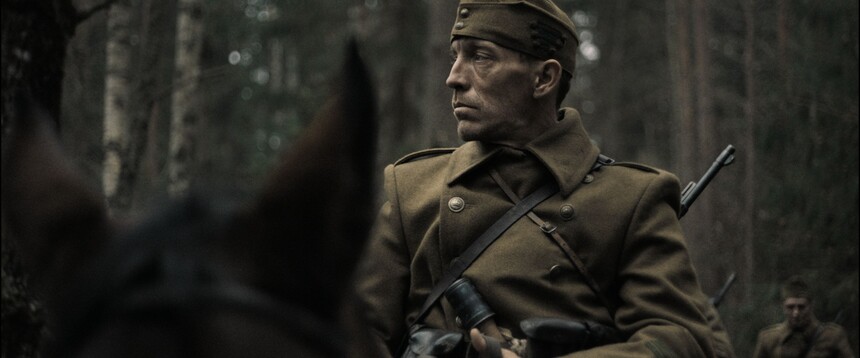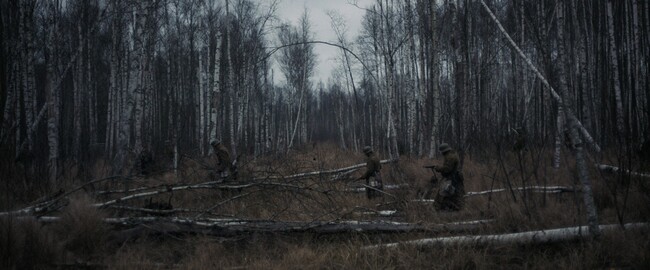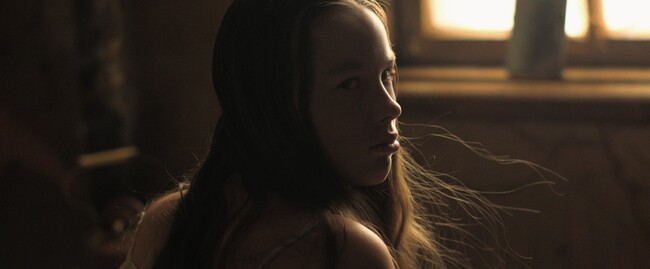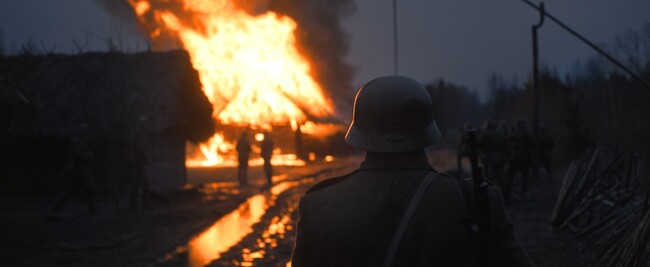Berlinale 2021 Review: NATURAL LIGHT, The Silent Banality of Evil

The debuting Hungarian director Dénes Nagy introduced his first feature-length film Natural Light in the main competition of the German festival.
Inspired by the book of the same name by Pál Závada, revolving around the inhabitants of a large Slovak-populated village in Hungary during WWII and events following it, Nagy picked just three days from 1943 out the novel's 20-year-period for his film. Those three days are perceived exclusively through a single character of István Semetka (the first outing of Ferenc Szabó).
Semetka, a taciturn corporal, is deployed into the woods scouting for Russian partisan groups in the occupied Soviet Union. Nagy goes against the conventions of epic war dramas focusing on the position of an individual, a small cog, in the whole machinery and his individual processing of the events the person has been thrown into.
Natural Light opens with a prelude setting tone to gritty and naturalistic aesthetics as the camera follows hunters in close distance. They are carrying their latest kill floating on a raft until a soldier on the shore calls them. Upon arriving at the shore, more soldiers emerge from the forest and start portioning the animal, silently but savagely, as hunters stand by.
The scene emanates the rawness of Alejandro González Iñarritu's The Revenant, and the film's DoP Tamás Dobos captures an impromptu vivisection in close detail. The only conflict that may have arisen from the encounter remains unspoken, unresolved, and wholly internalized foreshadowing Semetka´s ordeal in this part of the history.
The group of Hungarian soldiers arrives at a remote village with Semetka as second-in-command. The action is slow-burning and contrary to the depiction of WWII atrocities, no plundering or butchering take place upon the arrival. However, the tension between soldiers and civilians remains palpable.
Soldiers are interrogating the simple folk to find out whether they have been helping the partisans. After few encounters, it almost appears that the soldiers are warming towards villagers as their stay continues without an outburst of violence or the usual usurpation of whatever may come their way.
Semetka remains in the center of the story, a silent man with a stoic expression, who gives off a vibe he would rather be elsewhere. He continues to observe the military discipline carrying out all the orders. However, his interactions with locals slowly reveal a human side under the unflinching gaze and messy uniform.
Natural Light is above all a minimalist psychological portrait with Semetka serving as the main subject that is being carefully examined and observed. He is not a military material and he did not join the army for ideological purposes. On the contrary, the protagonist is an everyman force into the situation by circumstances. As it later transpires, he is a farmer which explains why he regards the locals with elementary dignity.
After Semetka´s unit departs from the village to continue on their quest, they are soon ambushed in the forest by partisans. With their leader killed, the leadership position passes to Semetka who decides to retreat back to the village. He senses the fateful encounter with partisans will have dire consequences as locals become the primary suspects in giving away the unit's position and their travel plans.
Nagy returns to the question of one´s position in the face of injustice, his impotency, and to a degree unwilingness, to prevent tragedies to occur but also to the immediate aftermath of a silent majority. Natural Light touches upon an almost Dostoyevskian conflict as Semetka once again becomes a part of a series of events that will leave him shell-shocked and scarred for life. The banality of evil clashes with a man´s helplessness to stop the cogs in the machinery that will most likely produce a terrible atrocity.
Natural Light is a strange combination of gritty realism and introverted contemplation that goes against the tradition of war and psychological dramas. Nagy further pushes Natural Light out of the standard box merging two opposing formalist choices. The director, DoP, and editor Nicolas Rumpl approach the image with almost a painterly reverence. Scenes are defined by a scarce dialogue, slow-burning action and hidden conflicts accentuate the crudeness anchored in the mundane as foreshadowed in the opening scene.
On the other hand, Nagy and Dobos borrow a method of handheld tracking in longer takes from the documentary filmmaking practice as they observe Semetka's inner struggle, which could be confused for complicity, from up close. In more than one aspect, Nagy employs a partially similar approach to his fellow countryman László Nemes tested in his spectacular debut Son of Saul to a great result. Nonetheless, contrary to Nemes' immersive spatial navigation, Dobos and Nagy lean more towards Béla Tarr's slow meditative format of cinema and naturalism.
Natural Light is thus a functional combination of classic and modern cinematic means of expression to broach war horrors and atrocities with sophisticated delicateness and implicitness. The director espouses the silent language of gestures, glances and mute faces to convey the inner drama and a variety of emotions that remain unspoken albeit not unexperienced.
Even though Nagy avoids graphic depiction that The Painted Bird did not shy away from, the sophisticated intensity of the drama and trauma grows near to implosion. Ultimately, the implicitness and tension that Natural Light builds up deliver the lasting effect of moral and personal discomfort while witnessing a vicious cycle of man-made atrocities.
Natural Light premiered at the 71st edition of Berlinale, where the film won the Silver Bear for Best Director.










